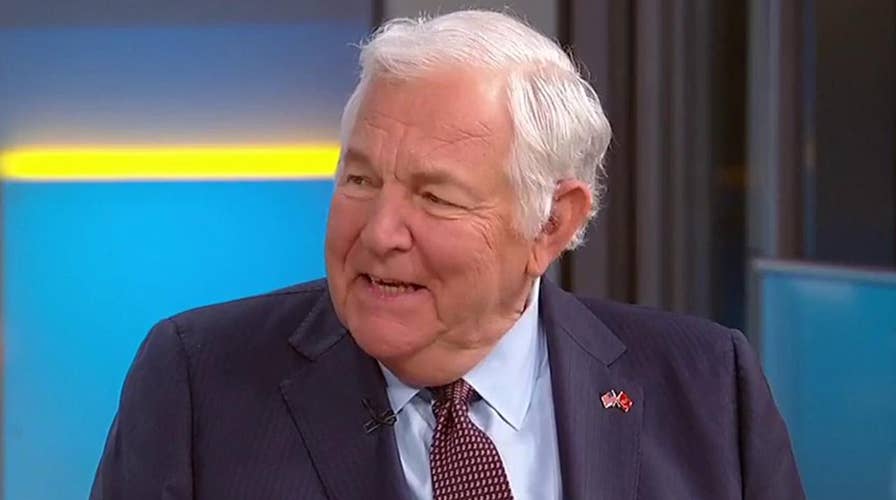Bill Bennett on America's opioid epidemic: The nature of the problem has changed
Fentanyl and heroin are much cheaper and more accessible than OxyContin, former drug czar Bill Bennett explains.
Since Special Counsel Robert Mueller started his investigation of President Trump, Congress has debated non-stop every single rumor and "redacted" line of the scandal. Russian collusion? Executive privilege? Contempt charges?
As the Beltway conflict further gridlocks our politicians, attention is being diverted from another, far more pressing matter: The deaths of over 72,000 people each year. But with our nation’s political leaders laser focused on the Mueller report, we are wasting emotional capital and critical time on one of the biggest issues facing our country right now: the national addiction crisis.
I’ll be honest. I’ve been a proud Democrat from the time I could walk. I’ve worked with the Democratic Party since middle school, and I was even a national delegate for Hillary Clinton in 2016. In many ways I’m a stereotypical left-leaning liberal. (Heck, I even live in California.)
LIBERTY VITTERT: THE OPIOID CRISIS IS REAL BUT DON'T PUNISH PATIENTS WITH LIFE-THREATENING PAIN
But when it comes to addiction, I know that some things are more important than party affiliation. I’m tired of seeing Democrats and Republicans alike fail to cooperate on issues that truly matter, such as solving our national public health crisis. We have to do better.
In 2017, the president declared opioid addiction a national emergency. At the time, it engendered a moment of political unity. In October 2018, the president signed bipartisan legislation that would add treatment options for addicted Americans, and required the U.S. Postal Service to begin screening overseas packages for synthetic form of opioids.
But since last fall, the focus has shifted to impeachment and a political free-for-all. And while our political leaders divert their attention to the circus that is the Mueller report, the drug epidemic continues to surge. Congress’ mudslinging match is distracting us (and the media) from the fact that more than 200 Americans will die today because of addiction.
The sooner Congress gets back to issues outside of the Beltway, the sooner we can focus on saving lives and ending the national drug epidemic for good.
The epidemic has not gone away. Our families, homes, and communities are suffering fatal losses on par with an armed conflict. In what has become a famous and sorely true anecdote, more Americans died last year than in the Vietnam and Iraq wars combined.
Why isn’t this bigger news? Because Congress and the media have found a sexier story. The victims of the drug epidemic are nameless, faceless, and powerless. On the other hand, the Mueller report sounds like it was ripped from an episode of “House of Cards.” But for those of us working on the front lines of addiction, we know that the faceless, nameless dead deserve just as much attention as Stormy Daniels and Attorney General William Barr. Their lives, and the lives of those at risk, are more important than any redacted name in the Mueller report.
Though it’s a rare day when I find myself in agreement with the president or Melania Trump, I was firmly behind the first lady when she spoke in Las Vegas in March. At the time, she said there should be more front-page stories about the opioid epidemic.
She was right. There should be front-page stories every day. There should be constant reminders for our political leaders and for the public at large that we are in the middle of the deadliest war our country has faced since World War II. It's the pharmaceutical drug war. While the coverage of lawsuits and criminal charges against pharmaceutical makers of opioids has been inspiring, we need to focus on solutions rather than just retribution.
Our political leaders are capable of real and impactful change. Whether that means state and local governments invoking emergency powers, accessing additional funds, or having the authority to take swift, radical action where the federal government has failed, our politicians have the capacity to turn this war around.
Just look at Dayton, Ohio. Once known as the “overdose capital” of the nation, Dayton is now leading the country in reducing overdose deaths with a nearly 53 percent decrease last year. Dayton took matters into its own hands and focused on local, community-based solutions such as harm reduction, housing, and community peer-driven support.
If it’s not a top issue, people will quickly forget the urgency of the crisis. Media coverage has meant the difference between life and death for many crises. Until the AIDS epidemic had a human face, and powerful support from compassionate leaders such as Princess Diana, our politicians allowed the plague to kill hundreds of thousands of innocent people. Now, the drug epidemic is claiming even higher numbers, but the people who suffer don’t have the microphone.
Unfortunately, the front page of almost every paper is focused on political drama and failing to cover this massive public health crisis. People are dying and our leaders are dropping the ball. That silence conspires with our social stigma around addiction. No one cares except for the people left behind.
CLICK HERE TO GET THE FOX NEWS APP
The choice is simple: we either work together, or we die. This crisis is a truly bipartisan issue. It's one of the few that has historically received unilateral support from leaders on both sides of the aisle. That’s why recovery, not political infighting, should be our nation’s top priority. Addiction doesn’t care who you vote for, where you live, how much money you make, or even what cable news station you watch.
The sooner Congress returns to issues outside of the Beltway, the sooner we can focus on saving lives and ending the national drug epidemic for good.









































